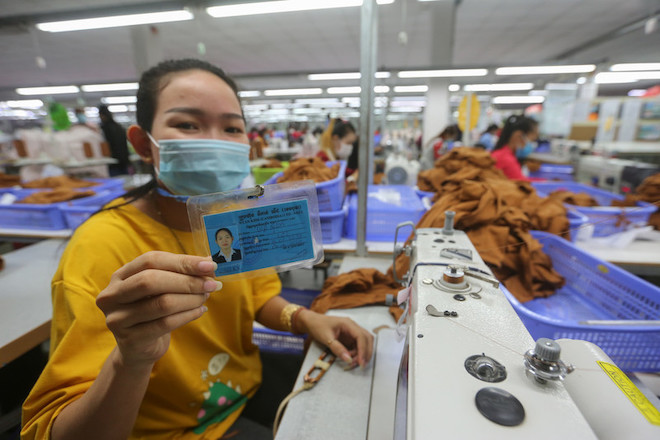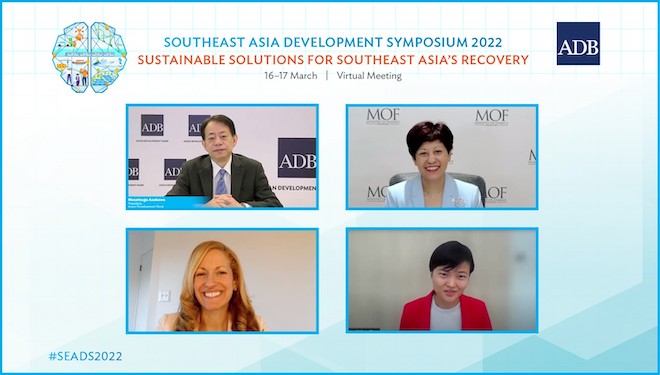
While Southeast Asia is showing signs of recovery in the wake of the coronavirus disease (COVID-19) pandemic, economies need to counter headwinds including tighter interest rates, widespread unemployment, weak investment prospects, emerging variants, and higher inflation, leaders said yesterday on the first day of the Southeast Asia Development Symposium (SEADS) 2022.
A new report, Southeast Asia Rising from the Pandemic, launched by the Asian Development Bank (ADB) at the event prescribed policy responses, including easing barriers to transport and trade, and boosting investments in education, training, health systems, social assistance, green infrastructure, and technology.
"Clear and focused efforts in these areas will ensure a more modern workforce, a safer and healthier population, greater protection for the most vulnerable, and stronger and more competitive businesses that are green and inclusive," said ADB President Masatsugu Asakawa in his keynote at the event.

New ADB report
According to the new ADB report, the loss of lives, disabilities from chronic illness, widespread employment losses, and the destruction of skills and human capital have raised unemployment, poverty levels, and inequality in the region.
The report said the pandemic pushed 4.7 million people in Southeast Asia into extreme poverty in 2021 and erased some 9.3 million jobs.
The report projected the region to grow 5.1% in 2022, up from the estimated 3.1% in 2021 and the 4.0% contraction suffered in 2020.
Greening Southeast Asia
Noting global headwinds facing the region, Singapore Minister in the Prime Minister’s Office, Second Minister for Finance, and Second Minister for National Development Indranee Thurai Rajah said greening the supply chain, infrastructure, and financing schemes are key to addressing the challenges.
Rajah considers supply chain disruptions among the most immediate challenges facing the region. “We will need to collectively address disruptions in global supply chains and uphold an open stable and rules-based trading system.”
She said Southeast Asia should build on the current global supply network to strengthen trade and supply chain connectivity and do so sustainably, noting integrating green solutions in various stages of the logistics value chain will not only improve productivity but also minimize the region’s carbon footprint.
Rajah also stressed the need to green the region’s infrastructure to address climate risks. “Infrastructure is and will continue to be an important driver of growth for Southeast Asia. With more adverse weather patterns that threaten low-lying coasts it's critical for the region to build sustainable and resilient infrastructure. Failure to invest adequately in this area can result in dire economic environmental and social impact."
ADB estimates that Southeast Asia needs about $210 billion annually in infrastructure investments to continue its economic growth momentum, eradicate poverty, and respond to climate change.
Public finance alone will not be enough, said Rajah. “Private and institutional resources must be mobilized to bridge this gap.”
She pressed the region to scale up sustainable finance to transit toward a greener low-carbon future, noting both governments and businesses need to tap green financing to meet their sustainability commitments.
The financial sector should also channel capital to environmentally friendly projects and technologies, she said.
Tech for green
In her keynote, Google Chief Sustainability Officer Kate Brandt also agreed on the need for more sustainability measures, noting the warming climate remains a critical challenge. “This is the decisive decade for action, from governments setting strong natural ambitions to companies embedding sustainability into every aspect of their business, to all of us committing to a more sustainable way of life.”
She cited Google data showing that over 80% of people say sustainability is more top of mind now than it was before the pandemic.
She also stressed the importance of technology to unlock green solutions. She cited Gringgo Foundation, which developed an app to allow waste workers in Indonesia to track the amount and type of waste that they collect. The app has resulted in improving recycling rates by 35%.
Brandt said Google has launched a $6-million sustainability seed fund to help nonprofits in Asia Pacific scale their promising technologies that are tackling climate change. The fund could finance initiatives like improving air quality, preserving water resources, and increasing access to renewable energy.
Helping MSMEs survive and thrive
Grab Cofounder Hooi Ling Tan, which delivered yesterday's closing keynote, stressed the need to help micro, small, and medium-sized enterprises (MSMEs) survive and thrive in the wake of the pandemic. “Grab saw first-hand how the digital transition was challenging for many small businesses. And the truth is, it is not just about getting them registered on an app or a digital service and then expecting magic to happen on its own right after. We must also take steps to ensure that they are equipped to harness the true potential of these digital tools. And one way of doing this is to invest in digital literacy and education.”
Grab collaborated with the Singapore government at the height of lockdowns to run virtual training programs for small food and beverage merchants and hawkers so that they have the skills to operate an online business. Grab also worked with Microsoft to run digital literacy programs for its driver partners.
However, more needs to be done for MSMEs, she said, citing a report from Grab’s think tank Tech for Good Institute showing that even though 85% of small business owners recognized that digital platforms are critical for their future successes, only 36% actually participate in them. “It is thus imperative that governments and private sector work together to arm individual and small businesses with the knowledge and tools to thrive online.”
Southeast Asia should also leverage fintech innovations to give MSMEs access to credit, she said, citing Tech for Good Institute’s report showing 60% MSMEs surveyed were unable to get a loan.
ADB Tourism Hub launched
Also yesterday, Mr. Asakawa launched the Southeast Asia Sustainable Tourism Hub website which is housed on the SEADS platform.
Last year, ADB established a $1.7 million technical assistance facility to accelerate Southeast Asia’s tourism recovery from the pandemic, boost inclusive, sustainable development in the sector, and help local tourism entrepreneurs, especially women and youth, adopt digital platforms to grow their businesses.
The Southeast Asia Sustainable Tourism Facility will help countries identify and prepare environmentally sustainable tourism projects and catalyze private financing to support them. It will help businesses better operate tourism facilities and deliver digital tourism services.
It will also help policy makers design visa, online short-term rental, and other policies to attract longer-staying, higher-spending visitors and remote workers, allow more small entrepreneurs to legitimately operate accommodation services, and boost tourism tax revenues.

